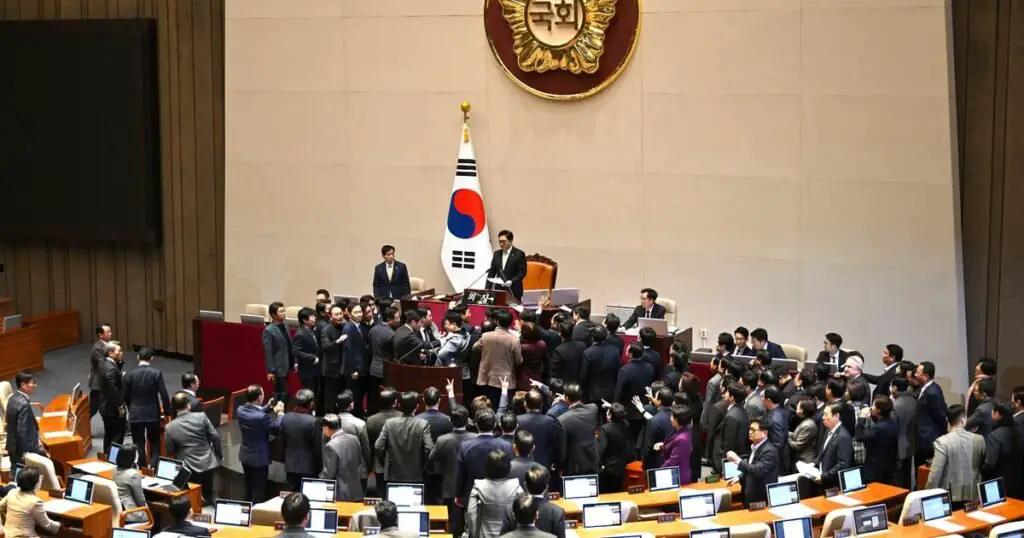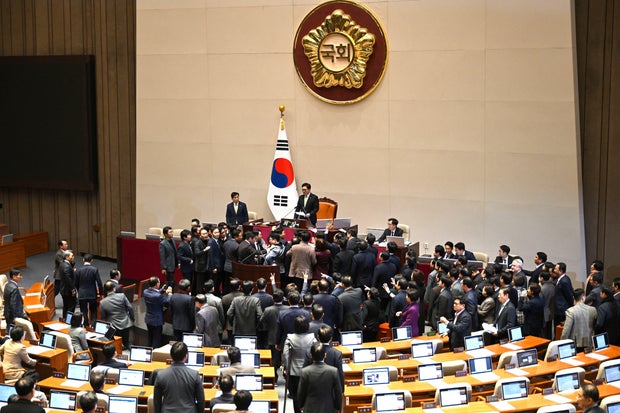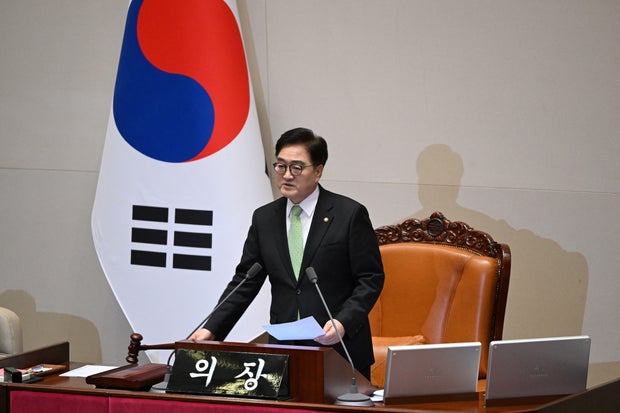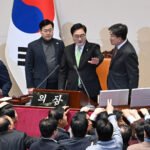Seoul, South Korea – South Korea’s opposition-controlled National Assembly voted on Friday to impeach incumbent President Han Duck-soo despite strong protests from ruling party lawmakers, further deepening the country’s political crisis sparked by President Yoon Suk Yeol’s stunning Declaration of martial law And subsequent impeachment.
Han’s removal from office means that he will be deprived of presidential powers and duties until the Constitutional Court decides on his dismissal or reinstatement. The court is already considering whether to uphold Yoon’s earlier removal from office. The ouster of the country’s two top officials is exacerbating political unrest, exacerbating economic uncertainty and damaging its international image.
The unicameral National Assembly approved Han’s impeachment motion by a vote of 192 to 0. Lawmakers from the ruling People Power Party boycotted the vote and gathered around the podium where Parliament Speaker Woo Won Shik sat, shouting that the vote was “invalid” and calling for Woo’s resignation. No violence or injuries were reported.
JUNG YEON-JE/AFP via Getty Images
PPP lawmakers protested after Woo called for a vote on Han’s impeachment motion after he announced that its passage required a simple majority in the 300-member assembly, rather than a two-thirds majority as claimed by the PPP. Most South Korean officials can be impeached by the National Assembly with a simple majority, but impeaching a president requires two-thirds support. There are no specific laws regarding the impeachment of a sitting president.
Han’s powers will be officially suspended when copies of his impeachment document are handed over to him and the Constitutional Court. Deputy Prime Minister and Finance Minister Choi Sang-mok will take over.
Agence France-Presse points out that PPP leader Kweon Seong-dong said after the vote that Han must “continue to run state affairs without giving in to the opposition’s passage of the impeachment motion.”
But Han said in a statement that he “respects parliament’s decision” and will wait for the Constitutional Court’s later decision on whether to uphold it.
JUNG YEON-JE/AFP via Getty Images
Han, who was appointed prime minister by Yoon, became acting president after Yoon, a conservative, was impeached by the National Assembly about two weeks ago over his short-lived declaration of martial law on Dec. 3. Han quickly fell foul of the main liberal opposition Democratic Party as he pushed back against opposition-led efforts to fill three vacant seats on the Constitutional Court, launch an independent investigation into Yoon’s martial law decree and pass pro-farmer bills.
At the heart of the fighting is the Democratic Party’s demand that Han approve the assembly’s nominations of three new judges to the Constitutional Court to restore its nine-member bench before deciding on Yoon’s removal from office. This is a politically sensitive issue because a court decision to remove Yoon as president requires the support of at least six justices, and the addition of more justices is likely to increase the prospects of Yoon’s ouster. Yoon’s political allies in the ruling People Power Party oppose the appointment of the three judges, saying Han should not exercise presidential authority to make the appointments while Yoon has not yet been officially removed from office.
On Thursday, Han said he would not appoint judges without approval from both parties. The Democratic Party, which has a majority in the Assembly, filed a motion to impeach Han and passed bills calling for the appointment of three judges.
South Korean investigators are investigating whether Yoon committed rebellion and abuse of power with his marriage law decree. His defense minister, police chief and several other senior military commanders have already been arrested over sending troops and police officers to the National Assembly, leading to a dramatic standoff that ended when lawmakers managed to enter the chamber and voted unanimously in favor of Yoons to override the decree.







